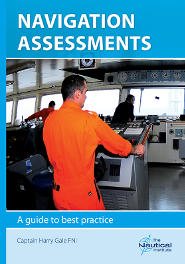Navigation Assessments – a guide to best practice
Find out more about the latest publication from The Nautical Institute.
PRESS RELEASE - for immediate release
Navigation Assessments – a guide to best practice
published by The Nautical Institute

30.11.16
Many maritime incidents could have been prevented by the use of a navigation assessment. The way that an assessment should be conducted to the best advantage of ship operator and crew alike is the subject of a new book published today by The Nautical Institute.
Navigation Assessments explains how an assessment conducted in a positive and constructive way can provide tangible benefits for maritime safety while contributing to the professional development of bridge team members.
The book was launched at a seminar at the Royal Institution of Naval Architects in London, where author Captain Harry Gale FNI, together with Paul Whyte AFNI of LOC, Captain Yves Vandenborn AFNI, Director Loss Prevention at The Standard Club, and Stuart Edmonston MNI of UK P&I Club, discussed navigation accidents and the value of carrying out assessments. They looked at why assessments are necessary and what should be done with the assessors’ findings.
Vandenborn said: “In recent years, The Standard Club has seen a worrying increase in incidents relating to navigation, which could have been avoided. Carrying out navigation assessments while sailing is essential in order to maintain navigational standards on board and prevent incidents.”
He continued: “This book gives detailed guidance on the importance of navigation assessments, how to carry them out properly and what to do with the information obtained. It is a valuable resource for anyone at sea and we are delighted to have worked with The Nautical Institute on it.”
“The use of the term ‘assessment’ rather than ‘audit’ is intended to emphasise the positive and to encourage crews to be truthful with assessors,” said Captain Gale, who is Technical Manager for The Nautical Institute. “An assessment should be conducted over several days at sea so that assessors gain an understanding of the culture on board and identify the navigation team members’ strengths and weaknesses. Coaching, consultation and feedback between assessor and bridge team can break down barriers and build stronger safety cultures.”
The handbook acts as a practical step-by-step guide that will enable the assessor to carry out a fair and objective assessment which properly takes into account human element issues. Navigation Assessments is also intended to help mariners understand the assessment process. Thirty case studies of recent maritime accidents and incidents provide valuable learning points. It provides insights into cyber-security, training and mentoring, communication and cultural understanding, and the end-of-voyage briefing.
“An assessment should be much more than ticking off boxes,” emphasised Captain Gale. “The assessor needs to actually observe the officers and bridge procedures over a period of time. The ultimate aim is to identify any knowledge gaps and to provide advice towards continual improvement of navigational practices.”
In his foreword to the book, Steve Clinch, Chief Inspector at the UK Marine Accidents Investigation Branch, states: “In my view, every ship’s manager, Master, deck officer and navigational assessor should have a copy of this guide to hand, no matter what their experience.”
Navigation Assessments is available from The Nautical Institute price: £40; ISBN: 978 1 906915 51 3
For more information and review copies please contact Bridget Hogan, Director of Publishing and Marketing, The Nautical Institute +44 (0)20 7928 1351, bh@nautinst.org
Editor’s notes:
The Nautical Institute is the international professional body for qualified seafarers and others with an interest in nautical matters. It provides a wide range of services to enhance the professional standing and knowledge of members who are drawn from all sectors of the maritime world. Founded in 1972, it has nearly 50 branches worldwide and some 7,000 members in over 110 countries. In 2015, the Institute was the proud recipient of the Investment in People Award for its free magazine The Navigator at the Seatrade Awards.
Please note: The Nautical Institute takes a capital T on The
end
